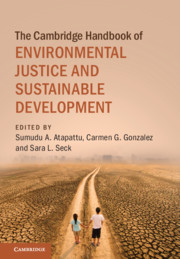Book contents
- The Cambridge Handbook of Environmental Justice and Sustainable Development
- The Cambridge Handbook of Environmental Justice and Sustainable Development
- Copyright page
- Contents
- Contributors
- Acknowledgments
- Foreword (on Living in an Interregnum)
- 1 Intersections of Environmental Justice and Sustainable Development
- Part I Frameworks
- Part II Case Studies
- Strategies, Challenges, and Vulnerable Groups
- Toxic Substances and Hazardous Wastes
- Resource Extraction
- Energy
- Climate Change
- 26 Climate Justice and the Social Pillar in California’s Climate Policies
- 27 Climate Change–Related Ecohealth Considerations for Impact Assessments in the Canadian Arctic
- 28 Climate Justice, Sustainable Development, and Small Island States
- Part III Conclusion
- Index
28 - Climate Justice, Sustainable Development, and Small Island States
A Case Study of the Maldives
from Climate Change
Published online by Cambridge University Press: 26 March 2021
- The Cambridge Handbook of Environmental Justice and Sustainable Development
- The Cambridge Handbook of Environmental Justice and Sustainable Development
- Copyright page
- Contents
- Contributors
- Acknowledgments
- Foreword (on Living in an Interregnum)
- 1 Intersections of Environmental Justice and Sustainable Development
- Part I Frameworks
- Part II Case Studies
- Strategies, Challenges, and Vulnerable Groups
- Toxic Substances and Hazardous Wastes
- Resource Extraction
- Energy
- Climate Change
- 26 Climate Justice and the Social Pillar in California’s Climate Policies
- 27 Climate Change–Related Ecohealth Considerations for Impact Assessments in the Canadian Arctic
- 28 Climate Justice, Sustainable Development, and Small Island States
- Part III Conclusion
- Index
Summary
The prospect of total submergence of small island states due to sea level rise associated with climate change raises several legal issues such as those relating to statehood and nationality, the right to self-determination of the people, and the whole array of rights that would be at jeopardy as a result of states disappearing. Climate change raises profound justice issues – those who contributed most to the problem are not those who will suffer the most, with the poor and the marginalized being disproportionately affected. At the same time, the inhabitants of these countries badly need to “develop.” What does development mean in the context of climate change? What does the social pillar of sustainable development mean for the people of small island states? What is the role of government? What is the responsibility of the international community, especially the major emitters and rich, oil-producing countries to provide climate finance, if not compensation for the damage caused? This chapter seeks to examine some of these questions through a case study of the Maldives. The chapter also sheds light on the role of governance and politics in relation to climate change and sustainable development as its leaders have vacillated between being climate crusaders and promoters of economic development.
- Type
- Chapter
- Information
- Publisher: Cambridge University PressPrint publication year: 2021
- 1
- Cited by

